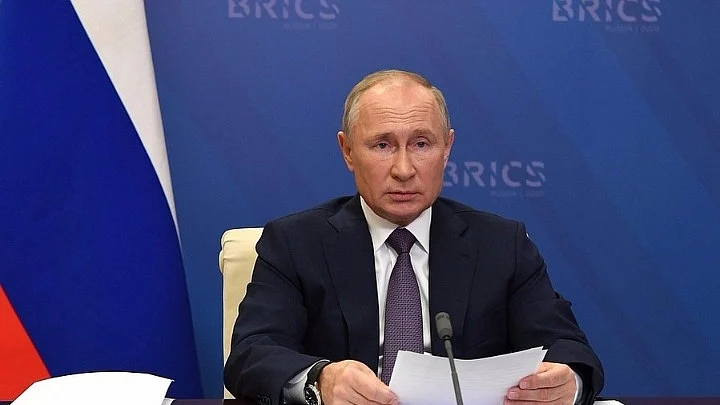Russia-Ukraine War: Ahead of war anniversary, Putin threatens to boost nuclear capabilities, meets Wang Yi
Putin's remarks came two days after he withdrew from the key bilateral nuclear disarmament treaty, START (Strategic Arms Reduction Treaty), with the United States

Ahead of the one-year anniversary of the Russia-Ukraine war, Russian President Vladimir Putin raised the possibility of bolstering nuclear forces on Thursday.
In a report issued by the Kremlin to mark Thursday's Defender of the Fatherland public holiday, Putin said: "As before, we will pay increased attention to strengthening the nuclear triad," said Putin, referring to nuclear missiles based on land, sea and in the air.
"We will continue mass production of air-based hypersonic Kinzhal systems and will start mass supplies of sea-based Zircon hypersonic missiles," he added.
The report also mentioned that Sarmat intercontinental ballistic missiles, a weapon able to carry multiple nuclear warheads, would be deployed in 2023.
Since the beginning of the War, Putin has consistently played with the idea of utilising Russia's nuclear capabilities, if needed. In two speeches from September, the 70-year-old President said that Russia "will do anything to protect its borders".
Putin withdraws from START
Moreover, Putin's remarks came after he withdrew from the key bilateral nuclear disarmament treaty, START (Strategic Arms Reduction Treaty), with the United States on Tuesday.
“They want to inflict a 'strategic defeat' on us and try to get to our nuclear facilities at the same time,” said Putin, announcing his decision to suspend Russia’s participation in the treaty. "In this context, I have to declare today that Russia is suspending its participation in the Treaty on Strategic Offensive Arms." The START was Russia's last remaining nuclear treaty with the US.
On Tuesday, during his "state-of-the-war" speech, Putin launched a scathing attack on the West, alleging that Western powers have orchestrated the conflict as they "seek unlimited power".
Sparring with US President Joe Biden on Wednesday, Putin accused Biden and the larger "Western intervention" of turning a "local conflict into a global opposition against Moscow".
Biden, on the other hand, visited Kyiv and met with President Volodymyr Zelenskyy, saying that the US is determined to protect the democracy and freedom of Ukraine.
The US President said that Putin's suspension of the START is a "big mistake"; however adding that he does not believe that Moscow will use nuclear weapons.
"I don't read into it that he's thinking of using nuclear weapons or anything like that," said Biden.
"We’re less safe when we walk away from arms-control agreements that are very much in both parties’ interests and the world’s interest," Biden continued. "But I’ve not seen anything where there’s a change in his posture, what they’re doing. The idea that somehow this means they’re thinking of using nuclear weapons, intercontinental ballistic missile, there’s no evidence of that," he added.
Putin meets China's Wang Yi, hints at meeting with Xi

Earlier on Wednesday, Putin held talks with China's top diplomat Wang Yi and emphasised on the significance of their bilateral cooperation. While welcoming Wang, the Russian President said that Chinese President Xi Jinping's visit is awaited.
"Everything is progressing, developing. We are reaching new frontiers," said Putin.
Beijing Foreign Ministry described Wang's visit to Kremlin "as an opportunity to discuss China-Russia relations and international and regional hot-spot issues of shared interest.”
Wang emphasised that Moscow and Beijing both support "multipolarity and democratisation of international relations", a reference to their shared goal of countering the Western dominance.
"Chinese-Russian relations aren’t directed against any third countries and certainly can’t be subject to pressure from any third countries," he said. Wang echoed Russia's perception of NATO and the US as an "existential threat".
Apart from Putin, Wang met Russian Foreign Minister Sergey Lavrov and Nikolai Patrushev, the secretary of the Russian Security Council.
"Our ties have continued to develop dynamically and despite high turbulence in the global arena, we have shown the readiness to speak in defence of each other’s interests," said Lavrov after meeting Wang.
The Russia-Ukraine war began on February 24, 2022, when Russia launched a military attack on neighbouring Ukraine, calling it a "special military operation". China has consistently provided diplomatic and economic support to Russia amid Western sanctions and growing divisions between Russia and the larger global community.
Follow us on: Facebook, Twitter, Google News, Instagram
Join our official telegram channel (@nationalherald) and stay updated with the latest headlines
